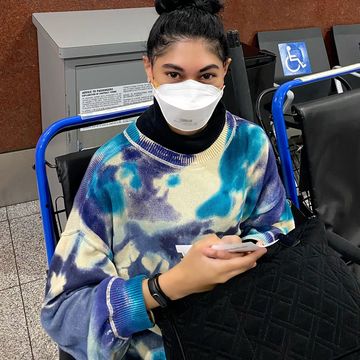When you're hit with a new project at work or spill coffee all over your favorite outfit, you probably recognize the typical signs of your stress meter rising. Cue the usual headaches, fatigue, and insomnia. You may also find yourself running to the bathroom more often and have less-than-normal bowel movements. Sure, sky-high anxiety levels can sometimes lead to issues like indigestion, but can stress cause diarrhea?
Turns out there’s a connection between your gut and your brain (a.k.a., the gut-brain-axis), says NYC-based gastroenterologist and WH advisor Samantha Nazareth, MD. Basically, the two organs talk to each other, and the gut microbiome has different lines of communication to the brain.
How does that work, exactly? Hormones, such as inflammatory cytokines, neurotransmitters, and kinins, interact between the brain and the gut’s local area, called the myenteric plexus, explains Cynthia Quainoo, MD, a gastroenterologist at Gastroenterology Associates of Brooklyn.
When you’re stressed, your body gets ready to enter fight-or-flight mode. “In order to do that, it puts the brakes on everything that happens during digestion,” explains Dr. Nazareth. “Digestion is de-prioritized and resources are rerouted in order to prepare you to react.”
Both big and small stressors have the potential to affect you this way. Sometimes, it can be situational, like if you have to give a big presentation at work, Dr. Quainoo says. In that case, the diarrhea (and stress) will go away once the situation resolves.
Meet the experts: Samantha Nazareth, MD, is a gastroenterologist based in NYC. Cynthia Quainoo, MD, is a gastroenterologist with Gastroenterology Associates of Brooklyn.
Chronic anxiety, depression, and phobias can also manifest as gut-related issues. One-off and chronic diarrhea are “the same, though there is no recovery time during chronic stress, as you are experiencing it without a break or rest,” says Dr. Nazareth.
Fortunately, there are ways to manage stress-related diarrhea. Ahead, learn how to do just that.
Why does stress cause diarrhea?
Diarrhea can be defined as a situation where “the poop is coming out too often and it's too loose,” says Dr. Nazareth. General rule of thumb: If you pass more than three stools a day, that counts as diarrhea.
The poop itself can range from being completely liquid, like water, to being very soft or not formed, Dr. Quainloo says.
Triggering the fight-or-flight response could result in an increased frequency or irregularity of gut contractions, leading to diarrhea, Dr. Quainoo notes. So, the time it takes for your stomach to empty could be cut short, causing an upset stomach, heartburn, indigestion, nausea, and vomiting, and faster movements in your colon, Dr. Nazareth adds.
For people who already have a gastrointestinal condition like Crohn’s disease and ulcerative colitis, added stress can make their symptoms worse, or cause a flare-up.
How do you stop stress-induced diarrhea?
If your stress does do a number on your GI system, here are a few ways to manage your stomach trouble, according to experts.
- Manage stress. Try light exercise, walking, yoga, meditation, or another activity you enjoy, says Dr. Nazareth. Other methods such as hypnosis and cognitive behavioral therapy (CBT) can potentially help too.
- Cut out certain foods. Some foods and drinks can make diarrhea worse, like coffee, fatty or fried foods, complex carbohydrates, simple sugars, spicy foods, and alcohol if you have a nervous stomach, so try cutting these out, says Dr. Nazareth.
- Try probiotics. This will stop the diarrhea quickly, Dr. Quainoo says.
- Increase your fiber intake. Soluble fiber soaks up water in the digestive tract, which makes stool firmer and slower to pass, per Mount Sinai. Good sources of soluble fiber include oats, peas, beans, apples, citrus fruits, carrots, and barley.
When do you need to see a doctor?
If it persists beyond one to two weeks and it's really bothering you, you should check in with a doctor, says Dr. Quainoo. Any sign of blood, weight loss, or pain should prompt you to see a doctor ASAP, since diarrhea caused by stress shouldn't be accompanied by these symptoms.
Addison Aloian (she/her) is an editorial assistant at Women’s Health. When she’s not writing about all things pop culture, health, beauty, and fashion, she loves hitting leg day at the gym, shopping at Trader Joe’s, and watching whichever hockey game is on TV. Her work has also appeared in Allure, StyleCaster, L’Officiel USA, V Magazine, and Modern Luxury Media.












